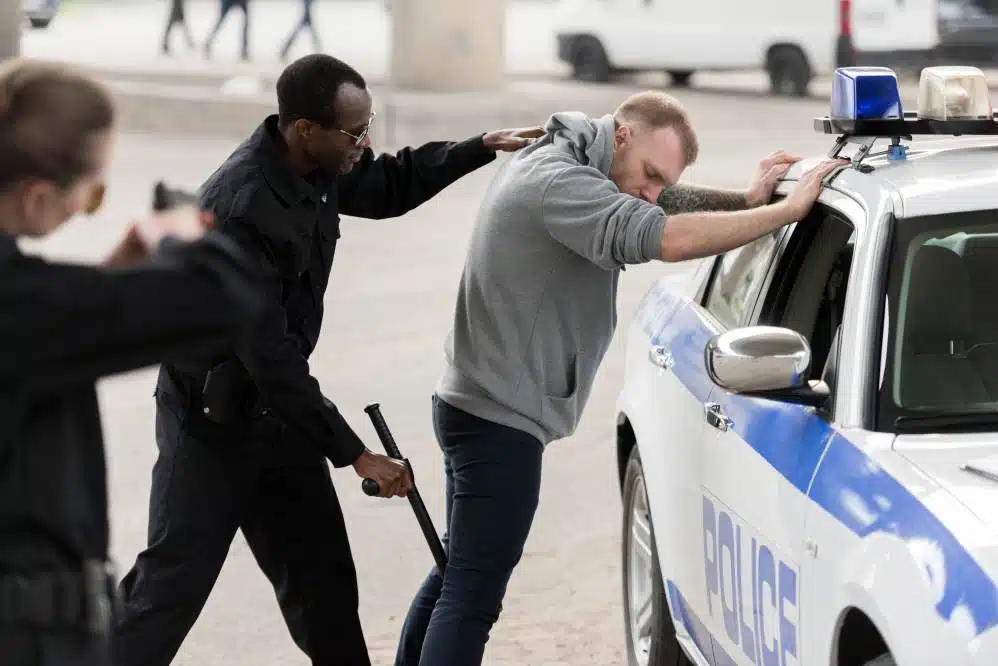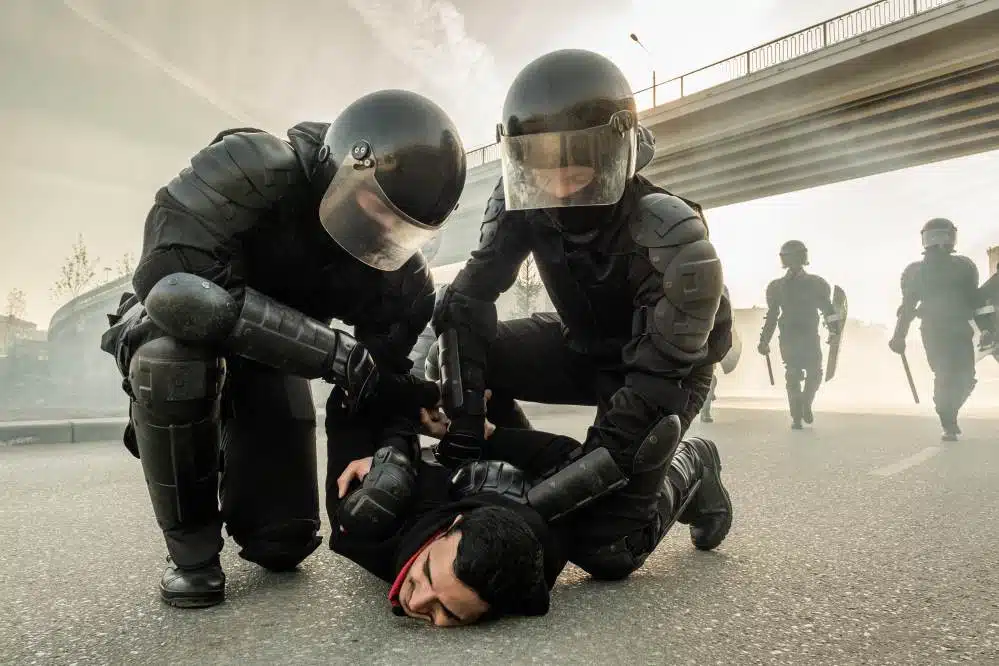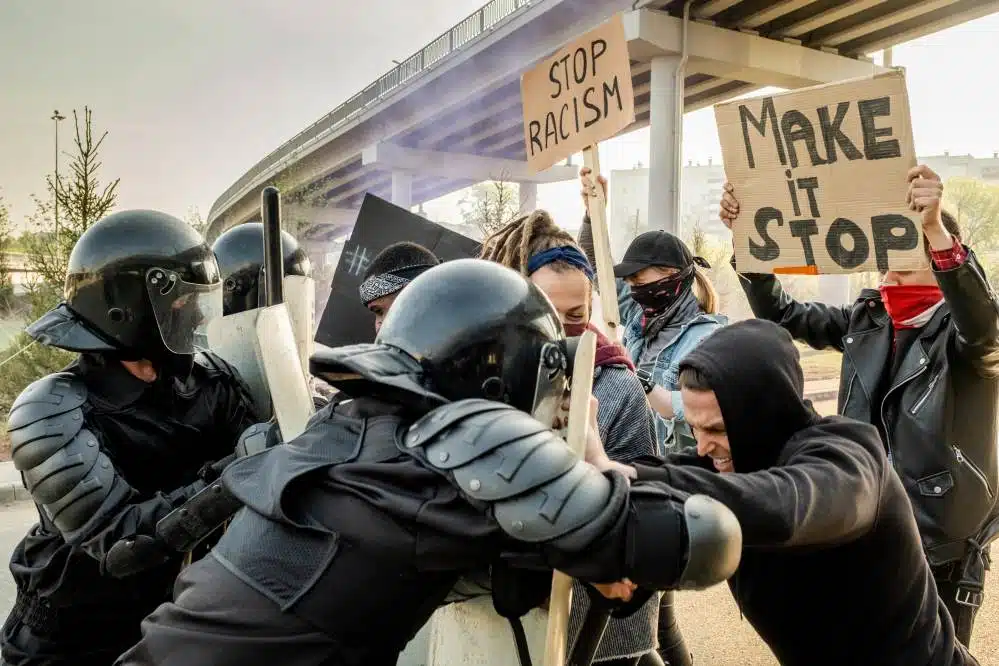
POLICE BRUTALITY ATTORNEYS
There have been a growing number of police brutality incidents in recent years and it is more important than ever to know what legal action you can take against a police brutality related injury.
Police are allowed to use a reasonable amount of force to uphold the law but there are many strict regulations in place that constitute what reasonable force is.
Police brutality can result in severe injuries and it is possible to open up a personal injury claim if you feel an officer’s excessive force caused this injury.
Get a free police brutality consultation when you call today.

WHAT IS POLICE BRUTALITY?
Police brutality is a very situational claim and whether you can claim an officer used excessive force or not typically depends on the situation and what led up to the use of force. In some situations, a police officer even has the right to kill a person if they pose an immediate threat to their lives.
However, depending on the nature of the crime, a police officer should not need to use their baton, taser, or even physical restraining measures. If you feel the crime you were being detained for was met with excessive force or threatening, contact a lawyer as soon as you can to file a personal injury claim for police brutality.
WHEN CAN A POLICE OFFICER USE FORCE, AND HOW MUCH FORCE CAN THEY USE?
Police officers can use force if the person they are detaining or in the process of detaining is displaying aggressive behavior or body language. They can use non-lethal weapons or even lethal force if the person has displayed a deadly weapon or is charging at them.
A police officer cannot use force if you ask for their badge number or disagree with them. If you keep a relatively calm demeanor and do not try to provoke the officer, they are not authorized to use force.
Also, you cannot resist the process of them putting on handcuffs if you are being arrested. Although, if you are not being arrested, they cannot put you in handcuffs unless you’re exhibiting aggressive behavior.
WHAT IS IDOL?
IDOL stands for Immediate Defense of Life and it is one of the only circumstances where a police officer is permitted to use deadly force. As stated earlier, there must be a clear danger to their life for a police officer to use deadly force of any kind.
Even when weapons are involved, the distance between the officer and the perpetrator matters in immediate defense of life situations. For example, if the person is brandishing a knife, the officer cannot use deadly force until the person gets within a certain distance.
What’s more is there must be some kind of attempt to calm the person down if they are not charging at them or exhibiting some kind of violent tendency. If the person is running away from the officer, IDOL is not in place and the police cannot use deadly force of any kind.
TYPES OF POLICE BRUTALITY INJURIES
Police brutality injuries can be mild, severe, or even fatal in the worst of circumstances. The police are allowed to carry a variety of weapons used to subdue law breakers and are trained to use physical force if necessary as well. Some types of injuries that have occurred from police brutality are:
- Fractured or broken bones
- Traumatic brain injuries
- Spinal injuries
- Wrongful death
You can even suffer from smaller injuries like sprains and muscle pulls from police brutality and all are as valid as the other. If you’ve experienced any of these injuries in an incident where the police used excessive force, contact a lawyer as soon as possible to open a personal injury claim.
KINDS OF POLICE BRUTALITY
There are many different kinds of ways police can use excessive force and it is important to know when these types of police brutality are being used. Some common types of this are:
- Excessive force using their gun
- False arrest
- Incarceration for an excessive amount of time
- Police dog bites
These kinds of police brutality are only the more typical cases but there are many other situations where an officer can use excessive force in a different way. It can be difficult to determine if these actions were necessary on the police officer’s behalf, however there are certainly ways to prove the officer is liable for your injuries in these cases of police brutality.
THE STEPS TO TAKE TO OPEN A CASE FOR POLICE BRUTALITY
Holding a police officer liable for your injuries due to police brutality can be difficult and a long legal process. Although, if you follow these steps, it can greatly help your case when you file a lawsuit.
First, document your injuries and note any medical bills and pre-existing conditions you may have. Knowing how much the injury has affected you financially and health-wise will be important to your compensation if the officer is found liable.
Next, is to try and document as many details of the event as possible. The better picture you can paint of how the event transpired the better everyone will be able to understand why you are claiming the officer was using excessive force.
Finally, you should follow police protocol until you can contact an attorney. The police follow strict procedures to ensure that people in their custody are not injured or incarcerated for an excessive period of time. Start building up your case as soon as possible.
CONTACT TRUSTED LAWYERS FOR POLICE BRUTALITY INJURIES
Police brutality can result in horrible injuries to people who did not deserve that kind of treatment. More and more cases are coming up where the police were proven to use excessive force and should be held liable for the injuries that they caused.
Law Leaders is a legal organization that has helped Americans of all kinds fight their legal battles against police brutality. Their expert lawyers are highly experienced in personal injury claims and can absolutely help you get the compensation you deserve from your police brutality injuries.
Get a free consultation when you call today to see if you may have a potential police brutality claim.
